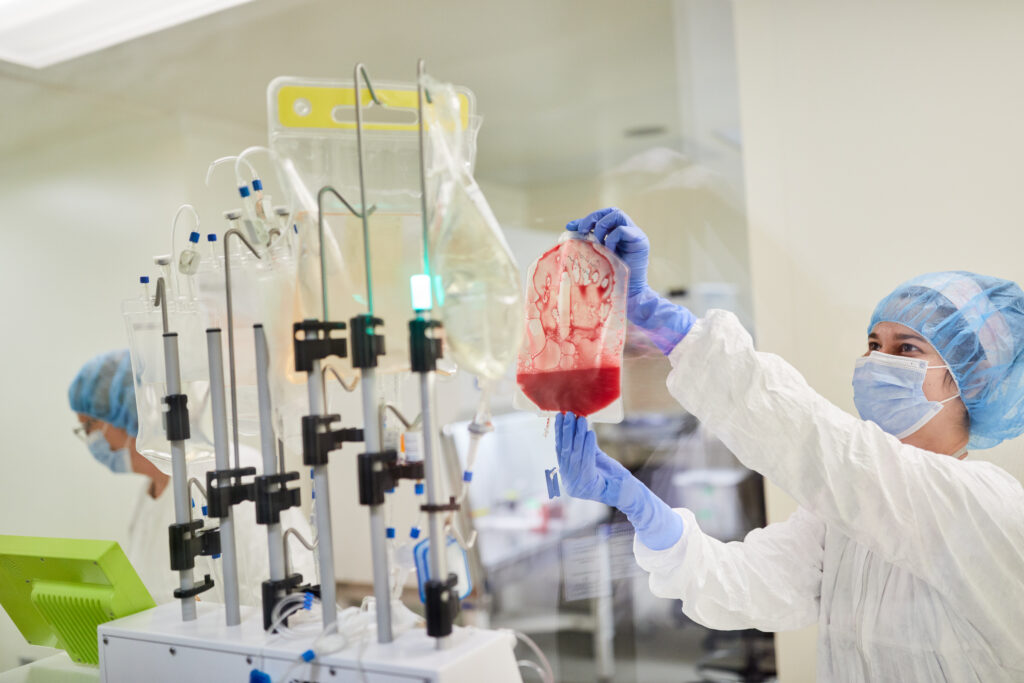In early 2022, immunotherapy specialists at Siteman Cancer Center at Barnes-Jewish Hospital and Washington University School of Medicine will begin a new clinical trial using off-the-shelf CAR T-cell therapy for the treatment of relapsed and refractory acute lymphoblastic leukemia (ALL). The therapy, developed by Washington University researchers at Siteman, incorporates many facets of the School of Medicine’s Center for Gene and Cellular Immunotherapy (CGCI), from basic and translational research, to an on-campus manufacturing facility, to expertise in clinical trials and patient care.
“This is a universal CAR T-cell therapy against CD7 that is manufactured for T-cell malignancies,” said Armin Ghobadi, MD, CGCI’s clinical director. “It is off the shelf, so it will be available right away for patients, in contrast to autologous CAR T that patients have to wait for, after several weeks of manufacturing. This is a novel cellular therapy for patients who have no other effective therapeutic options.”
This universal CD7 CAR T-cell therapy will be used first in a clinical trial for refractory ALL, as well as for lymphoblastic lymphoma in the first quarter of 2022. It will be followed by another clinical trial in the second quarter of 2022 using the same universal CAR T-cell therapy for patients diagnosed with T-cell lymphoma and acute myeloid leukemia (AML). These trials will provide an innovative, off-the-shelf universal CAR T treatment option with a very short time from enrollment to treatment that could be extremely important in patients with rapidly progressing cancers.
Onsite CAR T-cell manufacturing
Washington University School of Medicine and Siteman are home to a Good Manufacturing Practice (GMP) facility, where scientists will engineer CAR T-cells for the clinical trial. The facility is one of only a handful in the U.S. that can manufacture engineered CAR T-cells on the same campus where patients will receive them.
“Point-of-care manufacturing reduces the time between leukapheresis and the start of lymphodepleting chemotherapy and infusion of the engineered T-cells,” Ghobadi explained. “It allows us to offer a fresh, nonfrozen product without the need for a freeze-thaw process that occurs if the cells are manufactured elsewhere. We also can make more than one dose with each manufacturing run and then bank it, which enables ongoing treatment for patients who need it.”
That on-site manufacturing process cuts the time frame needed to retrieve, re-engineer and then infuse CAR T cells, from four weeks to just 10 days.
What to know
Washington University oncologists were among the first in the U.S. to offer personalized CAR T-cell therapy for the treatment of certain blood cancers, beginning in 2015. Currently there are five FDA-approved, standard-of-care CAR T-cell therapies available for specific types of lymphoma, leukemia and multiple myeloma.
To refer a patient for any cellular immunotherapy that is FDA-approved, or for participation in a clinical trial, Ghobadi offers these suggestions and information:
- Refer early. For patients diagnosed with relapsed or refractory hematologic malignancies, it’s important that they be referred as early as possible for consideration of any cellular immunotherapy.
- Collaborative care. Patients are under the care of Washington University oncologists at Siteman for several weeks prior to, and then a month after, CAR T-cell infusion. Patients then return to their referring oncologist for ongoing care, labs, intravenous immunoglobulin (IVIg) infusions and other care. Washington University CAR T specialists at Siteman are available for ongoing consultation over the long-term.
- Clinical trials. Patients eligible for the upcoming universal CAR T clinical trials will be seen at Siteman through their initial infusion. After a monitoring period, they again will be under the care of their local oncologist.
- On-site manufacturing. The ability to manufacture CAR T-cell therapies in the GMP facility enables Washington University and Siteman to reduce the time from initial consultation to infusion of CAR T products by at least three weeks.
- Universal CAR T. There are several active trials currently using off-the-shelf CAR T or CAR natural killer (NK) cellular products for leukemia and lymphoma. Two more clinical trials will open later in 2022 using a unique CD7 CAR T-cell therapy for T-cell malignancies.
Ghobadi notes that ongoing preclinical work will enhance the function of CAR T cells and broaden their application to include solid tumors. Within CGCI, clinical trials also are underway for other cellular immunotherapies, using CAR-NK, NK, TCR-T, viral CTL and, soon, tumor infiltration lymphocytes. These studies are targeting other cancers, such as breast, lung, prostate, renal, ovarian and liver cancers, as well as gastrointestinal malignancies.
“We’ve treated hundreds of patients with cellular immunotherapies with great success,” Ghobadi said. “Our main mission at the CGCI is to provide the most advanced cellular therapies for our patients. We do this by, one, providing FDA-approved cellular therapies at our center, two, conducting clinical trials using innovative cellular therapies and, three, conducting basic and preclinical research to develop more effective cellular therapies.”
He added, “I believe the CGCI is a great resource for answering questions and learning about the latest immunotherapy treatment options.”
For more information about the Center for Gene and Cellular Immunotherapy, visit CGCI.wustl.edu.
